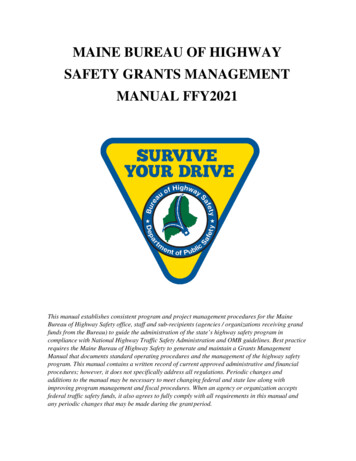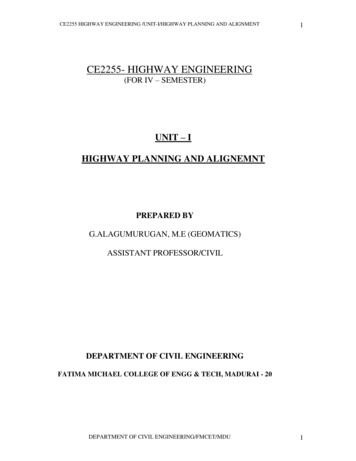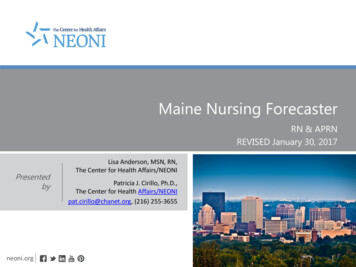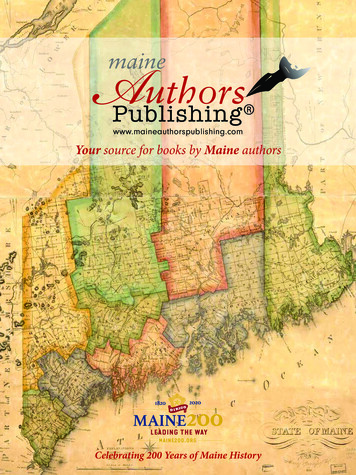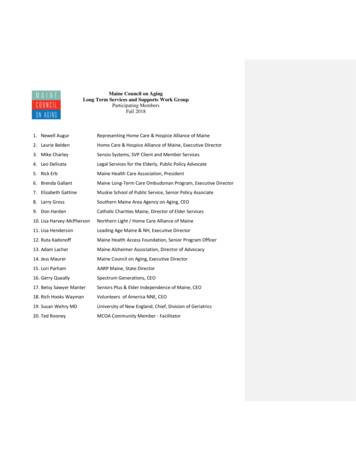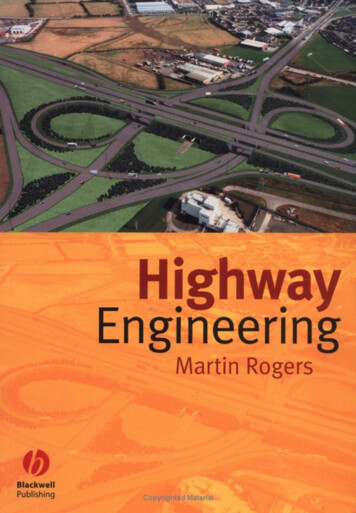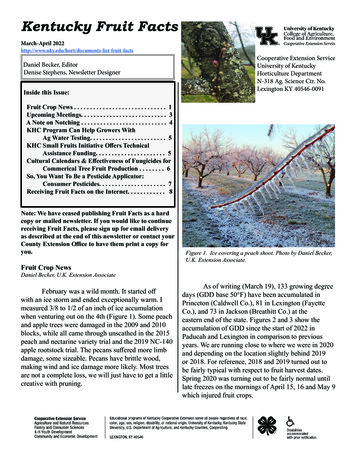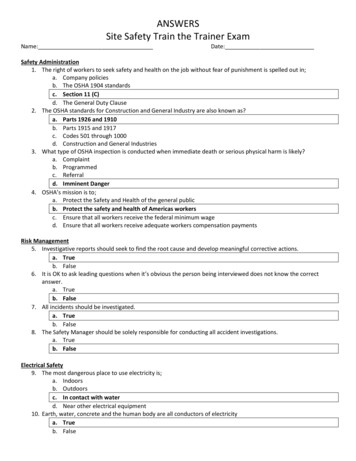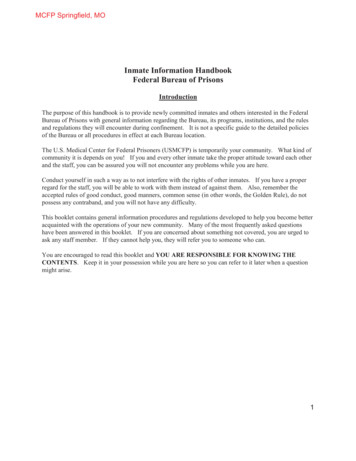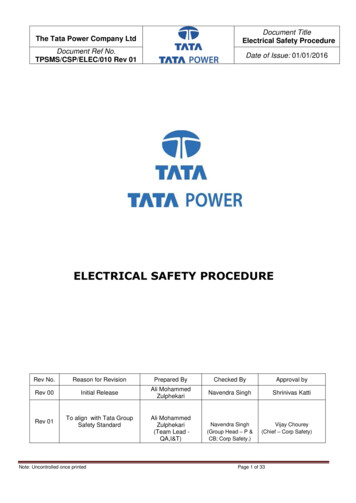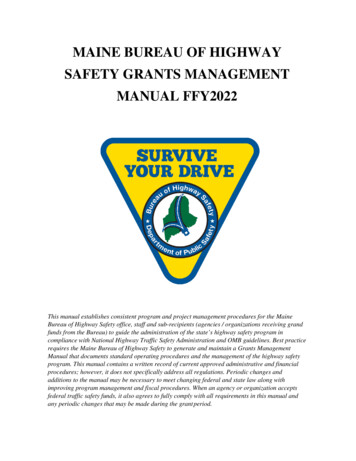
Transcription
MAINE BUREAU OF HIGHWAYSAFETY GRANTS MANAGEMENTMANUAL FFY2022This manual establishes consistent program and project management procedures for the MaineBureau of Highway Safety office, staff and sub-recipients (agencies / organizations receiving grandfunds from the Bureau) to guide the administration of the state’s highway safety program incompliance with National Highway Traffic Safety Administration and OMB guidelines. Best practicerequires the Maine Bureau of Highway Safety to generate and maintain a Grants ManagementManual that documents standard operating procedures and the management of the highway safetyprogram. This manual contains a written record of current approved administrative and financialprocedures; however, it does not specifically address all regulations. Periodic changes andadditions to the manual may be necessary to meet changing federal and state law along withimproving program management and fiscal procedures. When an agency or organization acceptsfederal traffic safety funds, it also agrees to fully comply with all requirements in this manual andany periodic changes that may be made during the grant period.
Maine Department of Public SafetyBureau of Highway Safety (MeBHS)45 Commerce Drive,Suite 1 164 StateHouse Station Augusta,ME 04333-0164Director: Lauren V. StewartTelephone: 207-626-3840Maine’s Bureau of Highway Safety (MeBHS) office website, offers a comprehensiveresource service located at www.maine.gov/dps/bhs. It serves as an information hub forall traffic safety initiatives including campaign reporting, training, and educationalprograms.All the forms referenced in this document may be found /index.htmlA list of MeBHS staff members is found at l address to submit grant applications, reimbursement requests and progress reports:bhsgrant.mdps@maine.gov
DefinitionsAMENDMENT/GRANT A formal change to an award and/or contract based on a modificationrequest when a specific term of the original contract changes.REVISION/GRANTAmendments are required when program activities and scope change;ADJUSTMENTwhen a project period changes; or if an award increase or decrease isrequested.BUDGET CATEGORYBroad grouping of budgetary expenses such as personnel costs, travel,commodities, etc.BUY AMERICA ACTThis act prohibits the MeBHS from using highway safety grant funds topurchase products, unless they are produced in the United States. Thisprohibition also applies to steel, iron and all manufactured products,unless the Secretary of Transportation has determined that it is appropriateto waive the Buy America Act requirement.CFDACatalog of Federal Domestic Assistance, provides a listing of all federalprograms available to state and local governments; federally-recognizedIndian tribal governments; United States territories and possessions;domestic public, quasi-public and private profit and non-profitorganizations and institutions; specialized groups; and individuals. Thisterm has been replaced by "Assistance Listing Number" in FFY2022.CFRCode of Federal Regulations, a listing of general and permanent rulespublished in the Federal Register by the Executive Branch of the federalgovernment and federal agencies.CLAIMExpenditures incurred in support of approved grant activities that agrantee may submit for reimbursement.CONTRACTAGREEMENTBinding document between the MeBHS and a local or state agency ororganization outlining the terms and conditions of receiving federalhighway safety grant funds.CPSChild Passenger Safety. Activities addressing the safety of children ridingin motor vehicles who are under the age of 13 years old.Maine Grants Management Manual i
EQUIPMENT ANDCAPITALPURCHASESNon-expendable, tangible property having a useful life of more than oneyear and an acquisition cost of 5,000 or more that is used only for trafficsafety and/or law enforcement purposesEQUIPMENTINVENTORYCONTROL REPORTDocumentation of status, serial number, grant name, and location requiredfor all equipment purchases made with grant funds.FAST ACT FINALRULETitle 23 Code of Federal Regulations (CFR) Part 1300 - UNIFORMPROCEDURES FOR STATE HIGHWAY SAFETY GRANTPROGRAMS.FFATAFederal Funding Accountability and Transparency Act, requires granteesto annually report each action that obligates 25,000 or more in federalfunds.FHWAFederal Highway AdministrationFINAL PROGRESSREPORTReport submitted by grantee following completion of the grant period,details the effectiveness of the highway safety project based on thegrantee’s goals and objectives.GMISMeBHS online grant application and reporting system which is referred toas the online grants management system throughout this manual.GRANTORThe state agency that awards federal highway safety grant funds. This isusually the MeBHS.GRANTORIENTATIONWORKSHOPTraining for all new grantees (recommended for all grantees) regardingthe grant management process.HIGHWAY SAFETYCOORDINATOR(HSC)MeBHS staff member responsible for the effective administration ofgrants and statewide highway safety programs.HSPThe annual Highway Safety Plan submitted by the MeBHS to NHTSA tosecure federal transportation grant funds for a Federal Fiscal Year.Maine Grants Management Manual ii
HVE GRANTHigh Visibility Enforcement. This is a grant awarded to a lawenforcement agency to target a specific traffic safety issue such asspeeding, occupant protection or impaired driving; highly visibleenforcement is coupled with a publicity strategy designed to educate thepublic and promote voluntary compliance with the law.LELLaw Enforcement Liaison. A law enforcement individual that provideslaw enforcement expertise to the MeBHS and grantees. This expertise isapplied for enforcement grant site selection, appropriate grant strategiesand countermeasures, and grant development. The LEL also conductsnetworking activities for local, county, and state law enforcementofficials, the MeBHS, and the Regional Office of the NHTSA. The LELreports to the MeBHS.MCOPAMaine Chiefs of Police AssociationMEBHSMaine Bureau of Highway Safety. Maine’s lead traffic safetyorganization tasked with addressing, managing and implementing theState of Maine’s behavioral highway safety program.MTSCMaine Transportation Safety CoalitionNHTSANational Highway Traffic Safety Administration. This is the federalagency responsible for administering the national highway traffic safetygrant program funded by federal legislation.OPOccupant Protection, seat belt and child safety seat programs.OUIOperating Under the Influence. This includes alcohol and drugs.PDPolice Department.PROGRAM GRANTOne year of federal fiscal funding awarded by MeBHS to a local or stateagency or organization to address a specific behavioral highway safetyissue.PROJECT DIRECTORIndividual within a local or state agency or organization responsible forestablishing and maintaining procedures within their agency to ensureeffective administration of the MeBHS approved grant. The projectdirector interfaces with the MeBHS HSC.Maine Grants Management Manual iii
PSAPublic Service Announcement. Public interest messages disseminated bythe media to raise awareness and change public attitudes and behaviortowards a social issue.REIMBURSEMENTREQUEST &EXPENDITUREREPORTA grantee must submit this document to request reimbursement for fundsexpended on an authorized project.RFPRequest for Proposal. This is a document that outlines fundingavailability to address a priority highway safety program area as outlinedin the HSP.PROGRESS REPORTReport describing tasks or activities the grantee has undertaken toaccomplish grant objectives and progress made in addressing their goal.SD/SOSheriff’s Department/Sheriff’s Office.SUPPORTDOCUMENTATIONDocumentation that supports claimed reimbursement such as reports,invoices, timesheets, copies of checks, etc.SFSTStandardized Field Sobriety Test, composed of three field sobriety testslaw enforcement officials use to detect impaired drivers.SUBRECIPIENT/GRANTEELocal or state agency or organization receiving a highway safety grantfrom MeBHS.TATravel Authorization, required for all travel oversight associated with agrant.UNIFORM GUIDANCETitle 2 Code of Federal Regulations (CFR) part 200 - UNIFORMADMINISTRATIVE REQUIREMENTS, COST PRINCIPLES, ANDAUDIT REQUIREMENTS FOR FEDERAL AWARDSUnique Entity IdentifierA unique alpha-numeric character number issued by the federal government used toidentify your organization to track how federal monies are allocated.The Unique Entity Indentifier replaced the DUNS number in FFY2022.Maine Grants Management Manual iv
Highway Safety ProgramThe Maine Bureau of Highway Safety (MeBHS) is Maine’s lead traffic safetyorganization. Located within the Maine Department of Public Safety in Augusta, theMeBHS is tasked with the responsibility of planning and implementing a comprehensivehighway safety program that utilizes NHTSA, FHWA, State and Community HighwaySafety Grant funds.In addition to administering grant funds, the MeBHS is also responsible for managingMaine’s Implied Consent Program, the Maine Driving Dynamics (Driver Improvement)Program, and the Federal Fatal Analysis Reporting System (FARS) program.The goal of these programs is to eliminate death, serious injury and property damageresulting from motor vehicle crashes so that all roadway users arrive at their destinationsafely. The MeBHS partners with law enforcement, government agencies, hospitals,universities, and non- profits to address Maine’s highway safety needs at the state andcommunity level through the use of Federal Highway Safety Grant Program funds.Development of the Highway Safety Plan (HSP)Problem Identification and Program Areas:A “traffic safety problem” is an identifiable group of drivers, pedestrians, vehicles, orroadways that is statistically higher in crash experience than is normally expected. Dataanalysis is essential to understanding who is crashing, where they are crashing, and why.The MeBHS reviews local, county, and state crash data to identify roadway users –motorists, pedestrians, bicyclists, teens, for example – with a statistically higher crash rate.This data, combined with citation, licensing, vehicle miles traveled, and demographicinformation, is analyzed to help the MeBHS and its partners understand what is promptingcrashes and the resulting injuries and fatalities on Maine roadways. Traffic safetyenforcement grants are awarded based on problem identification.The Maine Strategic Highway Safety Plan (SHSP) serves as an umbrella document for theHSP. The focus areas identified and the strategies outlined in the SHSP will help the Stateof Maine attain the goal of “Driving Toward Zero Deaths.”The Maine HSP projects are consistent with objectives listed in the Maine SHSP and thelatest version of the NHTSA publication Countermeasures That Work.Project DevelopmentThe process for selecting state and local safety projects occurs during Maine’s QuarterlyStrategic Highway Safety Planning Committee meetings. Stakeholders includerepresentatives from state and local governments, regional and municipal planningorganizations, law enforcement, EMS, courts, licensing, highway planners, engineers,health services and social services. In addition, the MeBHS staff meets regularly with theMaine Chiefs of Police Association, other stakeholders and highway safety partners toMaine Grants Management Manual 1
help determine the greatest traffic safety needs. All grant applications are reviewed andrated in an evidence-based environment.Priority is given to applications that demonstrate a highway safety problem as identified inthe SHSP, HSP, Traffic Records Strategic Plan and by NHTSA. The application mustoutline a clear plan employing proven countermeasures linked to measurable objectives. Allapproved grant- funded projects are included in the annual HSP that is submitted toNHTSA by July 1.The following table details the timeline of the grant application process:MonthJanuary - AprilMay – JulyActivity Obtain input and project ideas for future HSP planning andproblem identification processes. MeBHS announces upcoming grant application process. Initiate and attend highway safety partnership meetings. August – September October – December Grant proposals due and future projects agreed upon andincorporated into the MeBHS application to NHTSA.HSP application from MeBHS to NHTSA due July 1.MeBHS HSP reviewed and approved by NHTSA.Grant contracts are drafted in preparation of the FederalFiscal Year that starts October 1.Grantees notified of project acceptance by MeBHS.Federal Fiscal Year begins and grant contracts awarded.Prior Federal Fiscal Year ends and financial close-out ofprior grant programs begins.Annual Report generated and due to NHTSA by December31.Once the application period has closed, potential projects are sorted according to the focusarea most closely fitting the project. The MeBHS staff develops priority and fundingrecommendations using the criterion for assessing each project’s potential in an evidencebased environment to: Eliminate traffic deaths and serious injuries;Improve the operation of an important traffic safety system;Integrate as part of a community-wide crash elimination project; and,Increase the coordination of efforts between several traffic safety agencies.The MeBHS staff also evaluates past agency performance when recommendingfunding for future projects.Maine Grants Management Manual 2
All approved grant-funded projects are included in the annual HSP. The HSP has to besubmitted to NHTSA by July 1. NHTSA reviews and approves the HSP. Work associatedwith the grant cannot start until after October 1, which is the start of the Federal FiscalYear, and approval of the MeBHS contract.Grant Orientation Workshop, Pre-Grant Conference and ContractGrant Orientation WorkshopThe MeBHS conducts a new grantee orientation workshop shortly after the start of the newgrant period, typically in September and early October. While attendance is mandatory forall new grantees, all agencies receiving grants from MeBHS are encouraged to participate,and some may be required to do so at the discretion of MeBHS. The MeBHS staff willreview the grantees’ responsibilities and procedures, including any changes mandated bystate and/or federal law, occurring since the previous orientation. In addition to theorientation, this manual is available to assist grantees in the submission of progress reportsand reimbursement requests to assist with fiscal and program management requirements ofthe contract agreement.Grant ContractIf any aspect of the project changes between award notification and contract preparation, thegrantee is asked to make revisions and submit to the MeBHS. Once the grant application isfinalized, the MeBHS sends an award package to the grantee’s project director. The packageincludes a cover letter with detailed instructions, the grant contract agreement, andsupplemental forms.Following receipt of the award package, the grantee must return the signed grant contractagreement and supplemental contract forms with signatures to the MeBHS. If multiplecopies of the grant agreement are required, the authorizing agency representative must signall copies. Once these documents are returned to the MeBHS, the contract is signed. Theoriginal copies are retained at the MeBHS and copies are sent to the project director. Thesignature of the authorizing agency official indicates the grantee agrees to comply with therequirements outlined in the grant contract agreement. The grantee may not proceed with anyexpenditure of funds associated with the grant until the project director receives a signedgrant approval letter from the MeBHS Director.Grant RequirementsReimbursement of expended funds by the grantee is contingent upon the grantee complyingwith all requirements in the grant agreement and the appropriation of sufficient funds by thefederal government and the state highway safety program. The MeBHS doesn’t guaranteethe availability of federal highway safety funds for subsequent years funding.Once a grant has been awarded and becomes effective, the MeBHS reimburses the granteefor expenditures related to approved activities that have already occurred. The objectivesoutlined in the grant should be accomplished during the grant period and within theMaine Grants Management Manual 3
approved budget. If purchases are approved, it is preferable that purchases occur early inthe grant period for maximum benefit. Only costs incurred within the approved grantperiod that do not exceed the federally obligated funds as indicated in the grant agreementare reimbursed.Federal and State Regulations Governing MeBHS GrantsThe expenses and costs eligible for reimbursement under the MeBHS program are thosestipulated in the approved grant budget and grant contract. To be allowable, costs must benecessary, reasonable, allocable, and expended according to the appropriate federal andstate statutes or grant regulations. Grant management rules require the MeBHS to monitorgrantees to ensure compliance with applicable federal requirements and cost principles.The Office of Management and Budget (OMB) 2CFR Part 200, Uniform Guidance forFederal Awards, is the federal administrative regulation under which the MeBHS grantsoperate. It is referred to as Uniform Guidance. Agencies receiving highway safety fundsmust adhere to these requirements. At minimum, the MeBHS adheres to the requirements of2CFR Part 200. In some cases, such as the due date for grantee final progress reports andreimbursement requests, the MeBHS may be more restrictive to allow time for submissionof reports, which include grantee information, to NHTSA. If there are any questionsassociated with due dates please contact your HSC.AuditsAudits are conducted to determine the fiscal integrity of financial transactions and reports,as well as compliance with laws, regulations, and administrative requirements. All grantsawarded by the MeBHS that are federally funded by NTHSA are recorded in the Catalog ofFederal Domestic Assistance (CFDA). If a grantee or its parent agency expends over 750,000 in federal funds from any source, a single audit procedure is required by theSingle Audit Act for State and Local Agencies, 1996 Amendments, Public Law 104-156.The audit requirements are found in 2CFR Part 200, Audit Subpart F.Federal Funding Accountability and Transparency ActPassed by Congress in 2006, the Federal Funding Accountability and Transparency Act(FFATA) requires grantees to report each action (sub-award and executivecompensation) that obligates 30,000 or more in federal funds. The grantee is exempt fromthis requirement if, during the previous tax year, its gross income from all sources was lessthan 300,000. The FFATA information is gathered on the Federal Spending TransparencyAct Checklist form.Grantee Responsibilities and ProceduresWhen an agency or organization accepts federal highway safety funds, it also agrees to fullycomply with all requirements in this manual and any periodic changes that may be madeMaine Grants Management Manual 4
during the grant period. The project director will be notified in writing of any changes.It’s critical the project director has knowledge of the federal regulations outlined in 2 CRFPart 200 and the certifications and assurances included in Appendix “A” of this manual. TheGovernor is ultimately the responsible official for the administration of Maine’s highwaysafety program through the MeBHS (which has adequate powers and is equipped andorganized to carry out the program) and must assure compliance with applicable statutes,regulations, certifications and assurances. By accepting federal highway safety funds andentering into an agreement, a grantee agency or organization is also bound by thesestatutes, regulations, certifications and assurances.For HVE grants, the MeBHS requires that grantees participate in NHTSA reportingcampaigns emphasizing HVE (i.e., Click It or Ticket, Drive Sober or Get Pulled Over,)and any MeBHS meetings held during each quarter of the 12-month grant period.Additionally, HVE grantees must also submit statistics within two weeks following theconclusion of each NHTSA HVE reporting campaign to MeBHS.Financial ManagementThe project director is responsible for establishing and maintaining procedures within theiragency to ensure the effective administration of the grant agreement, including the timelycompletion of the grant objectives and proper record keeping. A Highway SafetyCoordinator is assigned to every grant and works with the project director and agencydesignated staff throughout the course of the grant period.The project director and grantee financial director must ensure the agency’s accountingsystem conforms to generally accepted accounting principles. A separate account or fundmust be established for each highway safety grant. It’s strongly recommended that copiesof all financial records pertaining to a grant be stored in a grant file (hard copy, electronicor both) maintained by the project director. This will make it easier to submitreimbursement requests, complete progress reports, respond to questions, and locatereference documents. This recommended practice will also aid in the on-site monitoring.The grant file should also include a copy of the grantee’s internal purchasing policies andprocedures. At a minimum, the policies must meet state standards; they may not be lessstringent. If no written policies exist, the grantee is subject to the state’s purchasingguidelines for cities and towns, counties and states.Financial ReportingTo receive reimbursement of authorized federal grant fund expenditures, a grantee mustsubmit accurate, current, and complete financial information as required in the agreementbetween MeBHS and the grantee. All authorized federal funds must be acquired and thework performed during the Federal Fiscal Year. The Federal Fiscal Year starts October 1and ends September 30. Only activities incurring during the current Federal Fiscal Year maybe claimed for reimbursement.Maine Grants Management Manual 5
Grantees must maintain records identifying the source (federal, state, and/or local) andapplication of funds for each budget line item. Grantees are responsible for trackingreimbursement by Assistance Listing Number coding provided by the MeBHS, and for theSingle Audit process.Internal ControlsA grantee must maintain effective control and accountability for all funds, property, andother assets. Additionally, the grantee must adequately safeguard all assets and ensurethey’re used only for traffic safety-related purposes.Allowable CostsThe MeBHS uses the cost principles outlined in 2 CFR Part 200 to determine necessary,reasonable, allocable, and allowable costs.The use of federal grant funds to purchase equipment and cover personnel and nonpersonnel costs (including overtime) are allowable within federal and state rules andregulations. Costs associated with training personnel for highway safety purposes areallowable if the training supports the objectives outlined in the HSP. Funds may not be usedto cover salary costs associated with employee attendance at training or employee’sreplacement while in training, unless that employee’s salary is MeBHS grant-funded.Federal grant funds may also be used for travel costs and per diem associated withattendance for both in-state and out-of-state highway safety-related meetings, conferences,seminars, workshops, and trainings where technical information is presented. The granteeshould retain records documenting the meeting's purpose and all associated costs. For travelthat is included in the approved grant budget, the grantee must follow state travelregulations. For travel not included in the grant budget, a written, detailed request forfinancial support must be submitted to the MeBHS in advance of the grantee’s travel dates.Once approved, state travel regulations apply. Travel and per diem reimbursement aredetailed in Appendix “B”.At MeBHS’s discretion, costs are allowable for highway safety consultant services providedby universities, public agencies, non-government organizations, and individuals for state orlocal highway safety support services or products consistent with 2CFR Part 200. Priorwritten approval by the MeBHS Director and adherence to state procurement procedures arerequired.If a grantee has a question about whether an item or activity meets the provisions outlinedin the grant contract, the project director should contact their HSC for clarification prior topurchasing the item or engaging in the activity.Maine Grants Management Manual 6
Indirect & Direct CostsThe total cost of the grant agreement with a grantee is the sum of the allowable direct costsand approved allocable indirect costs. A cost is determined to be reasonable if it is of a typegenerally recognized as ordinary and necessary for the performance of the grantee’s work.Direct and indirect cost categories can be confusing. For that reason, it is best to consultwith MeBHS staff who are familiar with 2 CFR Part 200 and can provide answers to granteequestions.Indirect costsIndirect costs represent the expenses of doing business that are not readily identified with aparticular grant, contract, project function or activity, but are necessary for the generaloperation of the organization and the conduct of the work activities it performs. In theory,costs like heat, lights, accounting and personnel could be charged directly to a specificproject if meters could record minutes in a cross-cutting manner to the specific project;however, this is not practical. Therefore, indirect cost rates are sometimes used to distributethese “overhead” costs to projects.Indirect costs are determined using one of threemethods: Method 1:Utilizing a federally negotiated indirect cost rate (IDCR). If a federally established IDCRis used, the indirect costs must be documented by a federal cognizant agency approvalletter and included in the grant file. The MeBHS may not force or entice the grantee toaccept a lower rate. If a grantee has a federally negotiated IDCR and requests that rate, theMeBHS may not request or require the grantee to offer a lower or zero IDCR. If a nonFederal agency or grantee voluntarily chooses to waive indirect costs or charge less thanthe full rate, it is allowable.Method 2:Use of the de minimus indirect cost rate of 10% if a negotiated indirect cost rate has neverbeen established; orMethod 3:A grantee that does not have, or ever had, a federally established IDCR and does not electa de minimus rate of 10%, may negotiate an indirect rate with the MeBHS. It is importantto understand the MeBHS is responsible for negotiating and/or monitoring the grantee’sindirect costs. The MeBHS Fiscal Manager is responsible for maintaining documentationfor all approved indirect cost rates. The MeBHS is responsible for approving indirect costrates for grantees based on an indirect cost proposal submitted by the latter that must: Identify all the work activities and associated costs carried on by the grantee withina base time period. All activities must be included regardless of the source of fundsMaine Grants Management Manual 7
used to pay for them.Classify the work activities and their associated costs as either direct or indirect.Eliminate from indirect costs capital expenditures and those stipulated asunallowable by 2 CFR Part 200.Direct costsDirect costs are those that can be readily and easily identified as required to fulfill theterms of the grant, contract, project, function or activity during a base time period suchas:1. Salaries or wages (including vacations, holidays, sick leave, and other excusedabsences) for employees working specifically on a project.2. Other employee fringe benefits allocable for direct labor employees.3. Consultant services contracted to accomplish specific work on a specific project.4. Travel of (direct labor) employees.5. Materials, supplies and equipment purchased directly for use on a specific project.6. Communication costs such as telephone calls or mailing services identifiablewith a specific award or activity.Staffing for HVE Crash Reduction Overtime PatrolsHVE Crash Reduction Overtime Patrols shall only be staffed with one officer/deputy/trooperper vehicle unless otherwise approved by the MeBHS. Certain programs allow for additionalstaffing to benefit activities conducted. Please refer to the subgrant application/contract forfurther details.Federal Expenditure MatchFederal grants administered by the Bureau of Highway Safety are intended to fund 80% ofthe total project cost. The remaining 20% of the total project cost shall be borne by thegrantee as a cash or in-kind contribution (match) as determined by the Bureau. In-kindmatches are expenses borne by your agency during the grant period in which those servicescontributed to activities associated with this grant. All in-kind match sources must complywith all federal regulations and must be supported with documentation to support the costs.In-kind match documentation shall be retained per federal regulation and be available foraudit by the Bureau of Highway Safety. To calculate your total project cost, divide yourfederal grant award by 0.80, see example below: 8,000.00 (federal funds) divided by .80 10,000.00 (total project cost) To calculateyour agency’s match requirement, you would then multiply your total project cost by0.20 (20%): 10,000.00 multiplied by .20 2,000.00 (your match cost).Maine Grants Management Manual 8
Grant Modifications and AmendmentsA grantee may request, or the MeBHS may recommend, a revision that modifies the originalbudget, goals, objectives, tasks or other section of the signed grant agreement. All granteerevision requests must be fully detailed and justified. If the request by the grantee calls fora change to the goals, objectives, tas
Maine Department of Public Safety . Bureau of Highway Safety (MeBHS) 45 Commerce Drive, Suite 1 164 State . timesheets, copies of checks, etc. SFST . Standardized Field Sobriety Test, composed of three field sobriety tests . Initiate and attend highway safety partnership meetings. May - July .
